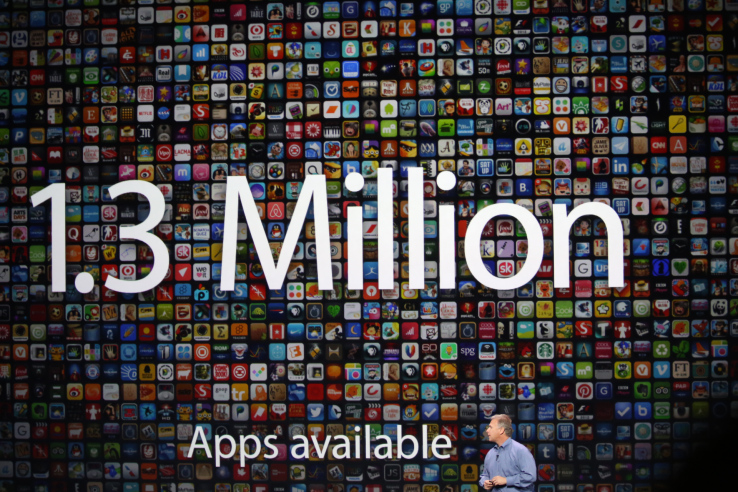https://www.youtube.com/watch?v=AZQkDzuD0Yg
GamesBeat: Who wants to throw out some examples here? We remember the age of keyword-stuffing. In this more advanced day and age, how should people think about keywords on iOS?
Pollack: Keywords, at least in my opinion, are one of the most important aspects of ASO. We were having a conversation about this question the other day. How hard is it to implement ASO in your app as a developer? The reality is it’s not hard, at least the basics – things like keywords, title, description. You can learn that in five minutes. The toughest part is figuring out what you’ll use in those spaces. We have some tricks that we use so we don’t duplicate keywords.
In iOS you get 100 characters. Android doesn’t give you a keyword field. You have to optimize the description and the name.
AI Weekly
The must-read newsletter for AI and Big Data industry written by Khari Johnson, Kyle Wiggers, and Seth Colaner.
Included with VentureBeat Insider and VentureBeat VIP memberships.
Malafeev: In the beginning, it was like the wild west of SEO in the ‘90s. It was about keyword-stuffing, putting in keywords as many times as possible in as many places. As time has gone on, things are getting more sophisticated – both because we’re getting more analytics data from Google and Apple, and because people are starting to move beyond simple keywords. They’re remembering that branding is still a thing. They’re looking at the conversion side. It’s getting more sophisticated.
Pollack: Say you have a game app and you put in “Facebook” as a search term. That’s not going to help you. It’s extremely competitive, but more important, that’s not the user you’re looking for. Downloads are not as important as really targeted users. You have to make sure you’re using the correct keywords. You could put in anything as a keyword, really.
Dotan: When you think about how you’re marketing your app from a search perspective—Consumers are searching for a particular sort of app. The more places you show up, the better, obviously, but it’s an optimization strategy. There’s a limited amount of terms you can show up for. It’s about figuring out the most relevant things the kind of user you’re trying to get is looking for.
Let’s say I have a mid-core title. Using the same keywords Game of War and Clash of Clans are using probably won’t work for me, unless I have a similar budget or similar level of installs already. It’s important to think about what’s relevant for you in your specific case, for the strengths of your application.
GamesBeat: It seems like you can apply a lot of common sense to ASO, but there’s also some science here. Can you talk about that, some of this new A/B testing that’s possible?
Niyogi: Where we’re different, how we’ve grown in the last few years, is that we’re able to make more data-driven decisions. As in every field, having this data and being able to test things out—With technologies like SensorTower and others, you can take a certain action in an update and see the results. As an app marketer, you know your baselines. You know which campaigns you’re running. You can see a difference in the organic installs. You can attribute part of it to the changes you make.
That’s the biggest difference where we’ve grown. Thanks to this technology, marketers can make more data-driven decisions.
GamesBeat: Do you have an example of analytics that work, things that you have to pay attention to?
Niyogi: One area is phrasing of keywords. We’ve tracked some combinations and were able to notice in SensorTower where we were ranking before and after. We certainly saw a jump in our ranking. We saw organic uptake because we used a certain combination of keywords in our space. It’s not just the most obvious ones – free poker, best poker. You can do a ton of experimentation. When you experiment in combination with the data and technology we have, you can see measurable differences.
Malafeev: We’ve been working with a number of different tools. We also use SensorTower for both app intelligence and store intelligence, which gives you approximated data on the number of installs different apps have. One thing we do is, a few people in our ASO team are designated to research. They’re mostly running regression analyses on the app stores, trying to reverse-engineer and figure out all of these things that you read online.
Titles are important. Descriptions are important. But what does that actually mean? Does it change things if you bold words or have them at the beginning of a sentence? Does it matter if you have keywords in your publisher name? As time goes on we’re starting to understand those things and learn more specifically the impact of what we do.
On the other side of things, there are starting to be rumblings about keyword tools for app stores. These are not coming from the app stores. They’re coming from other apps that have SDKs looking at users and figuring out what’s going on there. All sorts of things are making it more scientific. Dean mentioned the A/B testing platform. Google launched that a few months ago for the Play store, where you can test icons and screenshots and all that stuff. That’s another area where things have gotten very scientific. You can say, “I’m increasing my conversion rate by 26 percent.”
GamesBeat: Can you talk more about differences between Google and Apple?
Dotan: You think of Google as a search company. But what we’re seeing as far as app store optimization—Google is ahead with things like A/B testing, but in other senses Google is far behind. Apple at least lets you designate what you want to shop for. I’m in the United States. I want to shop for these terms. You’re able to optimize the keywords that you’re ranking for your title. You have 100 characters to put them there.
Google indexes a whole bunch of things across descriptions and so on. It’s very difficult to answer questions like, “My app is about weather. Why am I not in the first 400 results for ‘weather’?” At the same time, for developers who are improvising, they’re far ahead of the game in terms of allowing publishers and developers to test different creatives on their page of the app store. People are often taking those learnings and translating them over to iOS.
In a general sense, consumers are going to pull out their smartphone, go to the search tab within the app store, and search for some sort of phrase. That’s where search-based app store optimization comes in. You want to rank in the top 10, or ideally the top two. Those goals are similar across iOS and Google Play. You want to figure out the best development terms for your app.
Malafeev: What a lot of people think is, “What are my competitors using? I should use those words.” Our philosophy is, there’s a lot of demand out there. What did we say, 300 million searches a week? At the ASO level, we’ve created a technology to help find those words. Again, you still want to go for those bigger, more generic keywords, but there’s a lot of opportunity in people who are searching for something and not getting it. A lot of time you’re searching for an app and get no results. You’re not the only person making that search. There’s an opportunity there.
Dotan: Coming back to the original question of iOS versus Google, you have to look at the history of these companies and where they came from. Google comes from the world of search. They look at users and what your friends like and all those things. They scan reviews and look for keywords there. On the other hand, iOS comes from the world of music. There you can search for a title, an artist, or a genre. It’s a significantly less complicated world, where they’re saying, “Show me what you’re about. Tell me what you’re about.” Google comes from a perspective of, “I’ll figure out what you’re about.” There are ways to work with and nuance both, but that’s worth keeping in mind at the high level.
GamesBeat: How deep does the rabbit hole go here? If you’re a 700-person company, how many of them should be concerned with ASO? Or if you’re a 10-person studio, do you need anybody looking at this? Do you just call an outside consultant?
Niyogi: A lot of factors are in play. The genre, the maturity of your studio, where you are in the cycle, how big or small you are. What works for most companies, from a small developer to a moderate-sized one, it probably is not the greatest idea to do it in-house. You can go outside.
But the biggest thing people can do in marketing is raise awareness around ASO. Every marketer should be aware of what is going on in ASO. Follow best practices. Research. Get a tool. Learn about what’s relevant in the space. We try to follow what’s going on. We’re going to try to map things out using SensorTower, tracking different keywords and phrases. We’re not blindly chasing an algorithm, but we’re making it relevant. Relevance is key for conversion. However you define relevance in your organization, that is what your ASO strategy should revolve around.


